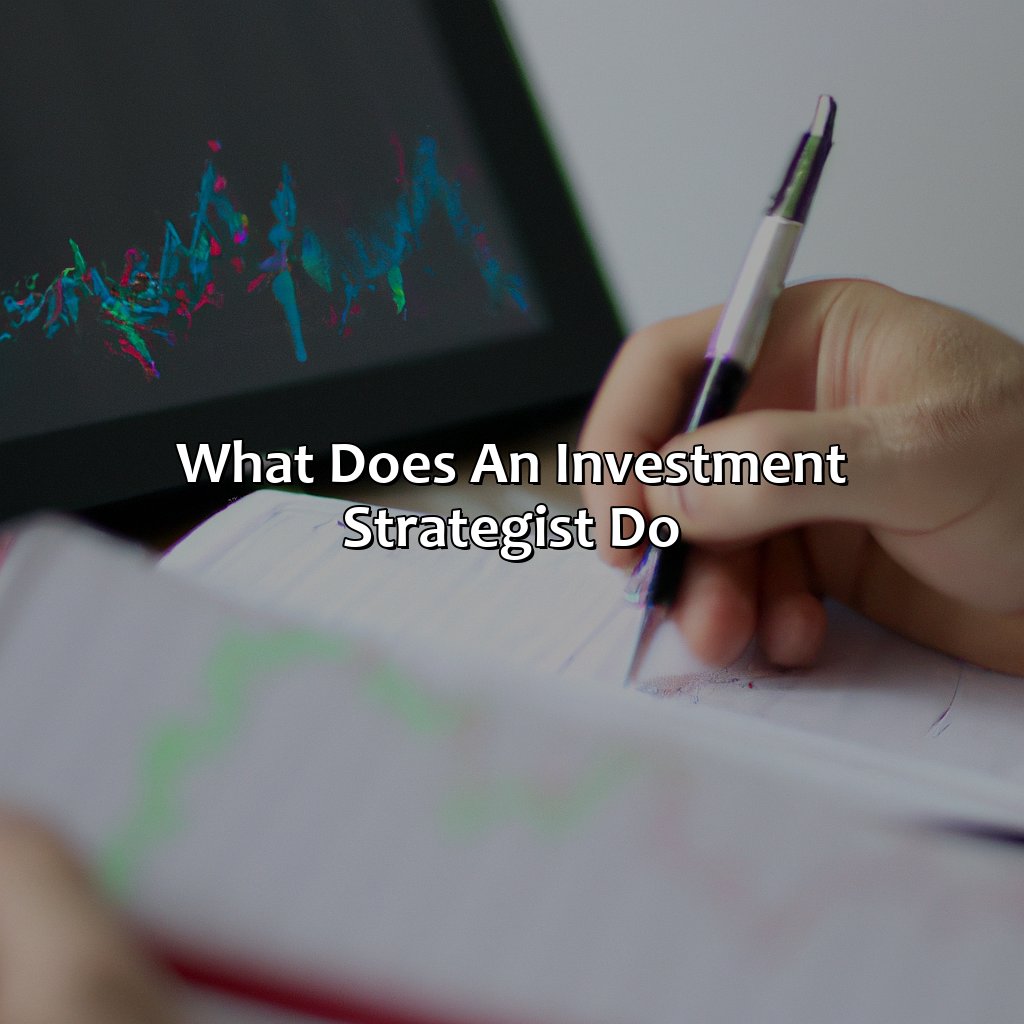What Does An Investment Strategist Do?
Key Takeaways:
- Investment strategists conduct research and analysis, develop investment strategies, provide advice to clients, and monitor investments and market trends.
- Strong analytical skills, knowledge of financial markets and instruments, as well as excellent communication and interpersonal skills are essential for success as an investment strategist.
- Industry certifications and licenses such as Chartered Financial Analyst (CFA) and Financial Industry Regulatory Authority (FINRA) can improve the credibility of investment strategists and increase their employment opportunities.
Are you looking to make smart investment decisions? A professional Investment Strategist can help you maximize your financial returns. You’ll learn how to navigate markets and make informed decisions. Discover what an Investment Strategist can do for you today.
Key responsibilities of an investment strategist
If you want to know the tasks of an investment strategist, look closely. This will show you what they do and let you make wiser decisions about investing. Their duties include:
- Creating investment strategies
- Advising clients
- Researching and analyzing
- Keeping track of investments and markets

Image credits: retiregenz.com by James Arnold
Conducting research and analysis
The investment strategist plays a crucial role in conducting comprehensive and thorough research and analysis on the financial markets, investment trends and global economic conditions. By utilizing various tools and techniques, the strategist analyzes data to assist in making investment decisions for their clients. This includes examining performance metrics like stock prices, earnings reports, economic indicators, market trends, regulatory changes and risk management strategies.
In addition to conducting research on financial markets and identifying opportunities for potential investments, the investment strategist is responsible for providing recommendations to clients based on their risk profile, financial goals and investment objectives. They are also responsible for monitoring client portfolios to ensure that they remain aligned with the client’s overall investment goals while providing updates on any material changes or developments.
The Investment Strategist’s role requires extensive knowledge of global economics, current events affecting markets. Successful strategists have demonstrated expertise in economics as well as broad experience working across various sectors of the economy including finance & banking. They may possess advanced degrees in business administration with a concentration in investments or finance.
Investment strategist roles have evolved over time- from relying solely on basic research tools such as broker bulletins received via fax machine- To now employing smart technologies like Natural language processing (NLP), Machine Learning (ML) technologies & Big Data software. With these state of art resources, investment strategists can identify intricate relationships between different forms of structured & unstructured data much more readily than ever before.
Planning to invest? Let an investment strategist handle it, because what’s the worst that could happen?
Developing investment strategies
Crafting investment tactics is a pivotal responsibility of an investment strategist. They must identify and analyze market trends, conduct thorough research on various financial instruments, and devise appropriate strategies that maximize their clients’ returns within set parameters. To develop an effective investment strategy, they consider the client’s goals, risk tolerance, time horizon and incorporate fundamental, technical, and quantitative analysis.
An investment strategist must have a multi-dimensional approach in crafting a viable investment plan. They carefully curate portfolios with diverse asset classes to ensure optimal returns while minimizing risk exposure. A strategist should also remain updated with ever-evolving market conditions as well as socio-economic changes to help clientele make informed decisions regarding their investments.
Investment strategists need to consider potential regulations on investments to help clients negotiate government regulations successfully. With each new regulation comes either increased opportunities for profit or severe limitations on growth opportunities.
Don’t miss out on maximizing your earnings! Trust the expertise of professional Investment Strategists who will create tailored plans for your success. Get ahead of the competition by collaborating with experts today! Because let’s face it, if clients wanted bad advice, they wouldn’t be hiring an investment strategist.
Providing advice to clients
As an investment strategist, one of the core roles involves providing insightful recommendations to clients regarding suitable investments. This requires a deep understanding of market trends, economic factors, and financial instruments. The strategist must analyze data, research information and utilize his/her expertise to give accurate and valuable advice. Sound judgment, decision-making skills and excellent communication are vital in this function.
In addition to providing recommendation advice, an investment strategist has the responsibility of projecting potential risks and rewards of various investment options. He/she must relay this information accurately to the client to help make informed decisions on optimal asset allocation. The strategist works towards building trust with clients by being transparent in all dealings related to investments.
It’s also imperative for the strategist to keep up-to-date with evolving market dynamics by constantly researching and staying informed about new developments as they happen. This knowledge helps in anticipating upcoming trends that may impact a client’s portfolio positively or negatively.
An interesting true story is when Company X hired an investment strategist who discovered that their diversified portfolio had low returns even though it was properly diversified across multiple sectors instead of being focused on high-performing sectors like technology. After careful analysis, the strategist reinvested a significant portion of the portfolio into technology stocks which resulted in higher returns which ultimately increased the company’s revenue.
Keep an eye on investments and market trends like a hawk, but without the sharp talons.
Monitoring investments and market trends
As a critical aspect of the investment strategy, keeping track of investments and market inclinations is crucial. An investment strategist implements a variety of methods to monitor and analyze these trends constantly. By continuously tracking investments, one can evaluate whether or not portfolio performance aligns with the established targets.
In addition to managing financial reports and undertaking risk assessments, an investment strategist must also have thorough knowledge about economic factors and business psychology. It enables them to identify opportunities for growth by examining market trends that could affect their clients’ portfolios. They should understand how politics, technology, trade agreements, global pandemics can impact the stock prices and the rebalancing of portfolios.
Remember that knowledge is power when it comes to strategic investments. Always make informed choices after relying on substantial research and analyses before embarking on investing decisions.
Pro Tip: Use automated monitoring tools such as AI algorithms or machine learning models for comprehensive tracking of investments in real-time, giving you a credible edge over humans manually performing duplicative tasks exponentially faster.
Qualifications? Just make sure you can spell ‘investment‘ and you’re already ahead of half the industry.
Required skills and qualifications
Ace your game in the investment strategist field! Possess strong analytical skills, knowledge of financial markets and instruments, plus excellent communication and interpersonal skills. To expand your competence, this section is your key solution. It includes three sub-sections:
- Strong analytical skills
- Knowledge of financial markets and instruments
- Excellent communication and interpersonal skills

Image credits: retiregenz.com by Yuval Jones
Strong analytical skills
Investment strategists are expected to possess exceptional skills in analyzing large amounts of data and deriving meaningful insights from them. As professionals, they are required to have a firm grasp of mathematical and statistical concepts that form the basis of their analytical prowess.
Their task involves identifying trends in the market, as well as conducting extensive research to track the performance of individual stocks, industries, and geographic regions. Coupled with their ability to spot opportunities before others do, investment strategists can offer valuable advice to investors on making informed decisions.
Moreover, investment strategists are expected to be proactive and creative when it comes to generating innovative solutions for their clients’ portfolios. They must be able to present complex information in a digestible manner and communicate their recommendations effectively.
In one instance, an investment strategist was tasked with managing a client’s portfolio during a period of significant turbulence in the market. The strategist had analyzed statistical models extensively beforehand and positioned the portfolio investments accordingly. The result was that the client made significant gains while many others faced substantial losses.
Having a nose for finance is great, but it doesn’t hurt to have a few eyes in the back of your head to keep an eye on those sneaky markets.
Knowledge of financial markets and instruments
A vital responsibility for an investment strategist is a profound understanding of the world’s economies and their tendencies. The strategist must recognize financial instruments’ performance and trading strategies for worldwide marketplaces, adjusting to unpredictable pricing discrepancies promptly. This knowledge includes the effects of events such as political changes, international trade conditions, interest rates, and a whole host of economic factors that affect various markets globally.
Furthermore, they have to keep themselves updated with developments and trends in the global economy continuously. An investment strategist should also possess expert analytical aptitudes and critical thinking capabilities to evaluate data from worldwide markets. They must do this to forecast market trends, identify opportunities and potential risks, create comprehensive reports for investors or internal decision-makers, recommend asset allocations with high returns on risk management strategies.
In addition to these essential skills, an investment strategist requires a Bachelor’s or Master’s degree in finance-related fields like economics or accounting or MBA degrees. A significant percentage of strategists furthermore obtain certifications like CFA (chartered financial analyst), FRM (financial risk manager), CAIA (chartered alternative investment analyst).
According to Forbes Magazine, “An Investment Analyst has been listed as one of the top ten highly educated highest-paying jobs in America.”
They say communication is key, but when it comes to investment strategists, it’s more like cracking a vault with your words.
Excellent communication and interpersonal skills
Having the ability to effectively communicate and build strong relationships with both clients and colleagues is a vital aspect of being an investment strategist. The role requires exceptional verbal and non-verbal communication skills, including active listening skills, the ability to give articulate and clear presentations, and convey complex information in an understandable manner. Additionally, investment strategists must possess excellent interpersonal skills, which involve being able to establish trust quickly, empathize with others’ issues or concerns, and navigate difficult situations effectively.
Furthermore, excellent communication and interpersonal skills are essential in building successful partnerships with other financial professionals like portfolio managers and research analysts. By maintaining effective communication channels, investment strategists can ensure that they remain up-to-date on market trends, provide timely investment advice, and implement strategies that align with their clients’ goals.
Investment strategists are also frequently called upon to participate in discussions on sensitive topics like client risk tolerance levels or new investment opportunities. For this reason, they must be highly proficient in tailoring their messaging to suit their audience’s level of knowledge while remaining respectful of their clients’ opinions.
Get ready to study hard and earn your stripes, because without the right certifications and licenses, you’ll be as useful as a stockbroker without a phone.
Industry certifications and licenses
Gain an edge in the investment strategizing biz! Get industry certifications and licenses, such as CFA and FINRA. These titles give you credibility. You’ll also get detailed and up-to-date info. This puts you ahead of the competition.

Image credits: retiregenz.com by David Jones
Chartered Financial Analyst (CFA)
A Professional Certification in Finance
This professional certification in finance, with a focus on investment management and analysis, is recognized globally and highly valued in the financial industry. It validates one’s expertise in investment analysis, portfolio management, accounting, ethical practices and economics. Those who earn this certification can work as financial advisors, portfolio managers or research analysts.
To earn this credential, candidates must pass three levels of rigorous exams covering a range of topics such as statistics, derivatives and fixed income securities. The credential takes an average of four years to complete and has a low pass rate of about 45%. Additionally, candidates must adhere to strict standards of professional conduct and ethics.
The history of this certification dates back to the 1940s when a group of investment professionals formed an organization that eventually became known as the CFA Institute. Today it boasts over 170,000 charterholders worldwide.
Why did the investment strategist study for FINRA certification? To avoid being regulated to the sidelines.
Financial Industry Regulatory Authority (FINRA)
The regulatory authority governing the financial industry is responsible for enforcing rules and regulations to protect investors. It is also accountable for ensuring fair and transparent business practices among its members. Compliance with these regulations demonstrates a commitment to integrity, professionalism, and due diligence in conducting financial transactions.
FINRA oversees broker-dealers and securities firms in the United States, as well as their professionals. The regulatory body works to protect investors by creating a standard of conduct for securities brokers and dealers. FINRA aims to maintain orderly markets, prevent fraud, investigate potential cases of misconduct, and provide investor education.
Unique details about FINRA include that it was formed through the consolidation of two regulatory bodies: the National Association of Securities Dealers (NASD) and the regulation division of the New York Stock Exchange (NYSE). Additionally, FINRA maintains an online BrokerCheck database that allows investors to review information about brokers’ professional backgrounds.
To ensure compliance with FINRA standards, investment strategists must follow ethical guidelines outlined by the organization. Investment strategists should prioritize transparency when educating clients about potential risks associated with investment options. It’s also important to update customers regularly on their portfolio’s performance while remaining unambiguous when explaining complex financial concepts.
By adhering to FINRA’s regulation framework, investment strategists can foster trust with clients while maintaining high standards within their industry.
Five Facts About What Investment Strategists Do:
- ✅ Investment strategists are financial professionals who provide guidance on portfolio management and investment decisions. (Source: Investopedia)
- ✅ They utilize economic and financial analysis to identify investment opportunities and trends in various asset classes. (Source: The Balance)
- ✅ Investment strategists work with individuals, corporations, pension funds, and other institutions to develop investment strategies that align with their goals and risk tolerance levels. (Source: LinkedIn)
- ✅ They are knowledgeable about global financial markets and economic conditions and use this information to make informed investment decisions. (Source: Indeed)
- ✅ Investment strategists constantly monitor and adjust investment portfolios to ensure optimal performance and alignment with clients’ objectives. (Source: Glassdoor)
FAQs about What Does An Investment Strategist Do?
What does an investment strategist do?
An investment strategist is a financial professional who helps individuals and organizations make investment decisions by providing advice and developing investment strategies that align with their financial goals and risk tolerance.
What kind of education do investment strategists need?
Most investment strategists have at least a Bachelor’s degree in Finance, Accounting, Economics, or a related field. Many also have a Master’s degree in Finance or an MBA.
What skills does an investment strategist need?
Investment strategists need strong analytical and problem-solving skills to analyze financial data, identify trends, and make informed investment decisions. They also need excellent communication and interpersonal skills, as they often work with clients to develop personalized investment plans.
How do investment strategists help clients manage risk?
Investment strategists help their clients manage risk by diversifying their portfolios across different asset classes and sectors, which helps reduce the risk of loss during market downturns. They may also recommend insurance products or other financial instruments to mitigate risk.
What kind of clients do investment strategists work with?
Investment strategists work with a wide range of clients, including high net worth individuals, corporations, pension funds, and other institutional investors.
What is the job outlook for investment strategists?
According to the Bureau of Labor Statistics, employment of financial analysts, including investment strategists, is projected to grow 5 percent from 2019 to 2029, which is faster than the average for all occupations. This is due to the increasing complexity of financial markets and the need for expert advice in managing investments.


